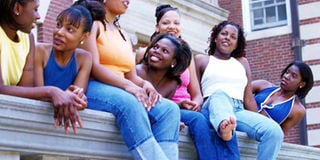Cultural clash: Why calling strangers ‘mummy’ and ‘daddy’ in Kenya left my Nigerian friend shocked

Titles communicate the function the bearer performs, and not used as a sign of respect
What you need to know:
- In certain contexts, titles are important because they carry a deeper meaning—such as the title ‘doctor’ in a hospital setting, which communicates the ability to attend to a medical emergency.
- I never quite think of titles as a sign of respect; in my view, titles communicate the function the bearer performs. This is what I tried to explain to Helen.
On Tuesday last week, my Nigerian friend, Helen, sent me a message that I initially found hilarious—until I realised she wasn’t joking.
“There are many cultural shocks I have seen in the hospital. When elderly patients come, and I greet them with ‘Welcome mummy’ or ‘daddy,’ they look at me like, ‘Don't you know your parents?’ For us [in Nigeria], that is a respectful way of greeting elderly persons and establishing a bond with them even if you are seeing them for the first time.
“The worst is when I bend or bow to greet elderly people; the staff members will be giggling and laughing, and it's so embarrassing. Nobody told me to stop. I do it unconsciously because that's how I was brought up, but I am seriously unlearning…” her message read.
Helen currently lives and works in Kenya (this is her second year in the country). She volunteers at a hospital in Kisumu County where she is bewildering total strangers by calling them “mummy” and “daddy.” Her message had me in fits of laughter.
As hard as I tried, I couldn’t see myself calling a total stranger ‘mummy’ or ‘daddy’ because, to me, it just sounds dramatic. Beyond that, calling someone I don’t know “mummy” or “daddy” reeks of an overfamiliarity that borders on crossing certain undisclosed personal boundaries, which I consider disrespectful.
After the laughter had died down, we dove into the nitty-gritty of how cultures vary even in seemingly ubiquitous things, like how we address people in formal and informal settings.
“In Kenya, we operate by default on a first-name basis, except when there’s a prefix like Dr Jones or Mrs Smith. Otherwise, I say ‘Hi,’ I ask your name, you say ‘Mary,’ and I call you ‘Mary’ for the rest of our engagement,” I explained to her.
Honestly, I don’t think much about titles. In certain contexts, titles are important because they carry a deeper meaning—such as the title ‘doctor’ in a hospital setting, which communicates the ability to attend to a medical emergency.
I never quite think of titles as a sign of respect; in my view, titles communicate the function the bearer performs. This is what I tried to explain to Helen.
Let’s thank God that phone slaps haven’t been invented yet because Helen would have slapped me through the phone.
“You people just behave like the oyinbos (white people). I was really irritated when a lady of my age called someone of my mum's age by her name in the hospital. Hey! Not even Mrs whoever. To us, that's the height of disrespect—you wouldn’t dare,” she said.
This conversation continued until after midnight and didn’t stop for the rest of the week. Eventually, our discussion morphed into an exploration of notions of respect. I am careful to refer to people by their formal titles unless otherwise expressly indicated. In informal settings, I address people by the context I know them from or how they introduced themselves to me.
If I met someone as a teacher, I will forever prefix their names with that title, regardless of how our relationship evolves. That means that Madam Brema (my high school biology teacher) still bears the title ‘madam’ even in our conversations today. My friends’ parents? I refer to them as the father or mother of so-and-so, not by name.
I know the subject of ‘mummy’ and ‘daddy’ can’t be complete if we don’t address the elephant in the room. Do I call my pastor ‘mummy’ or ‘daddy’? No, I don’t. I call them Pastor, Bishop, Apostle, Reverend, or whatever title they officially bear. This, too, was not satisfactory for Helen.
“Mummy is not just your biological mother but any woman within the range of your mother's age—an elderly female of importance to you, like a mentor, or a spiritual mummy, like a pastor's wife of any age,” Helen said.
“My best friend is 52 years old; how do you suggest I address her?” I asked, trying to counter her logic.
Her response? I should call her “Big Aunty”! Well, I knew I had to give up on winning that debate.
So, tell me, what is the most interesting culture shock you’ve had to deal with in life so far?
The writer is the Research & Impact Editor, NMG ([email protected]).





